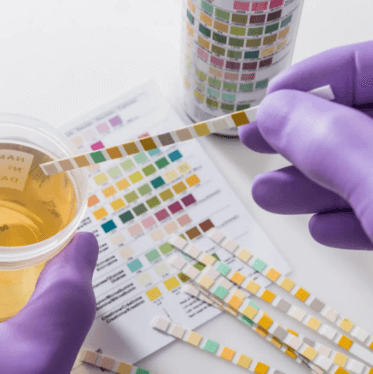In today’s world, where the use of CBD products has gained significant popularity, individuals may have concerns about how these products could potentially impact drug screening tests.
One common question that arises is whether CBD can show up on a 10-panel drug screen. This article aims to explore this topic objectively by examining scientific research and legal considerations surrounding CBD and drug testing.
Imagine a scenario where an individual regularly uses CBD oil for its potential health benefits. However, they are now faced with a mandatory drug screening at their workplace or as part of a legal requirement.
The fear of potentially testing positive for THC, the psychoactive compound found in cannabis, raises concerns about the consequences it may have on their personal freedom and professional life. Understanding the relationship between CBD and drug testing becomes crucial in such situations to make informed decisions while ensuring compliance with workplace policies or legal obligations.
Understanding CBD and THC
CBD is a non-psychoactive compound derived from the cannabis plant, while THC is the psychoactive component responsible for the intoxicating effects of marijuana.
When comparing CBD and THC, it is important to note that CBD does not produce a ‘high’like THC does. This distinction makes CBD an attractive option for those seeking the potential benefits of cannabis without experiencing any mind-altering effects.
CBD oil, in particular, has gained popularity due to its various potential health benefits. Research suggests that it may help with conditions such as chronic pain, anxiety, epilepsy, and inflammation.
However, it is essential to highlight that more studies are needed to fully understand the therapeutic potential of CBD oil and its long-term effects on human health.
How Drug Screening Tests Work
Drug screening methods are used to detect the presence of drugs in a person’s system.
A 10-panel drug screen is a commonly used method that tests for ten different substances, including marijuana, cocaine, opioids, amphetamines, and benzodiazepines.
Each substance has a different detection window, which refers to the period of time during which it can be detected in a person’s urine or other bodily fluids.
Overview of drug screening methods
One commonly used method for determining the presence of substances in an individual’s system is through drug screenings, which employ various techniques to analyze bodily fluids or tissues. Drug screening methods can include urine tests, blood tests, hair follicle tests, and saliva tests.
Each method has its own advantages and limitations in terms of drug screening accuracy and detection window. For instance, urine tests are widely used due to their convenience and cost-effectiveness, but they may have a shorter detection window compared to hair follicle tests.
It is important to note that drug testing regulations vary depending on the jurisdiction and purpose of the test. Certain industries or organizations may require more comprehensive panels, such as 10-panel drug screens, which detect a wider range of substances including cannabinoids like CBD.
However, it is worth mentioning that standard 10-panel drug screens do not specifically target CBD; instead, they typically focus on detecting substances such as cocaine, marijuana (THC), amphetamines, opioids, benzodiazepines, barbiturates, methadone, propoxyphene (PPX), methaqualone (Quaaludes), and phencyclidine (PCP).
Therefore, under normal circumstances where only a standard 10-panel drug screen is conducted without specific testing for CBD metabolites or cannabinoids in general, it is unlikely that CBD usage will result in a positive test result. However, individuals should be aware that some specialized drug screens or confirmatory tests may be able to detect CBD or its metabolites if specifically requested or required by certain circumstances.
Specifics of a 10-panel drug screen
The 10-panel drug screen is a comprehensive testing method that focuses on detecting a range of substances, including commonly abused drugs and controlled substances.
This type of drug screen is designed to provide specificity and accuracy in identifying the presence of specific drugs in an individual’s system.
The panel typically includes tests for marijuana (THC), cocaine, amphetamines, opiates, phencyclidine (PCP), methamphetamine, benzodiazepines, barbiturates, methadone, and propoxyphene.
Each test within the panel has been carefully calibrated to provide accurate results for each respective substance.
By utilizing this multi-panel approach, the 10-panel drug screen aims to comprehensively identify the presence of different substances in order to ensure an accurate analysis of an individual’s drug use history.
Detection windows for different substances
In the realm of substance detection, it is imperative to explore the varying timeframes within which different substances can be detected in an individual’s system.
Detection windows for alcohol can vary depending on factors such as the amount consumed and an individual’s metabolism. On average, a breathalyzer test can detect alcohol for up to 24 hours, while urine tests may be able to detect it for up to 80 hours. However, it is important to note that these timeframes are not set in stone and can vary from person to person.
Additionally, hydration levels can also impact drug test results. Being well-hydrated may dilute the concentration of drugs or alcohol in urine, potentially leading to false-negative results. Conversely, being dehydrated may result in higher concentrations of substances in urine samples, increasing the likelihood of a positive result.
Therefore, maintaining proper hydration levels is crucial when undergoing any type of drug screening test.
CBD and Drug Screening Tests
This discussion will explore the differences between CBD and THC, the potential for CBD to show up on a drug screen, and the factors that may affect test results.
CBD is a non-psychoactive compound found in cannabis plants, while THC is the psychoactive component responsible for the ‘high’ associated with marijuana use.
When it comes to drug screening tests, CBD has the potential to show up depending on various factors such as dosage, frequency of use, and the sensitivity of the test being used.
However, it is important to note that most standard drug tests do not specifically screen for CBD but rather focus on detecting THC or its metabolites.
Differences between CBD and THC
Distinguishing characteristics between CBD and THC can be observed when examining their chemical structures and psychoactive effects.
CBD, or cannabidiol, is one of the many compounds found in cannabis plants. Unlike THC, or tetrahydrocannabinol, CBD does not have any psychoactive properties and does not produce a ‘high’effect. This key difference makes CBD an attractive option for individuals seeking the potential benefits of cannabis without experiencing mind-altering effects.
Additionally, CBD has gained attention for its potential medical uses, including relieving pain, reducing inflammation, and alleviating symptoms associated with various conditions such as epilepsy and anxiety.
On the other hand, THC is known for its psychoactive effects and is responsible for the euphoric sensations commonly associated with marijuana use.
While both CBD and THC interact with receptors in the body’s endocannabinoid system, they have different effects due to their distinct molecular structures.
Understanding these differences is crucial when exploring the therapeutic potential of cannabinoids like CBD for medical use.
Potential for CBD to show up on a drug screen
When considering the potential for CBD to show up on a drug screen, it is important to understand how these tests are conducted and what substances they are specifically designed to detect.
A 10-panel drug screen typically looks for the presence of various drugs, including marijuana (THC). CBD, on the other hand, is a non-intoxicating compound derived from the hemp plant and does not produce psychoactive effects like THC.
While CBD products may contain trace amounts of THC, the levels are usually too low to be detected by standard drug tests. However, it is worth noting that some highly sensitive tests may be able to detect even small amounts of THC in CBD products.
If an individual consumes large quantities of CBD or uses products with higher THC concentrations, there could be a possibility of it showing up on a drug test. Therefore, individuals who are concerned about employment drug tests should exercise caution and choose CBD products that have been tested for THC content and adhere to legal limits.
Read Also: The secret to ultimate happiness with Happy Lane CBD
Factors that may affect test results
One important consideration in interpreting drug test results is the potential influence of various factors on the outcome. These factors can affect the accuracy of the test and may lead to false positive or false negative results.
To paint a clearer picture, here are four key factors that can impact the reliability of drug screenings:
- Sensitivity and specificity of the test: Drug tests vary in their ability to detect specific substances accurately. Some tests may have lower sensitivity levels, meaning they are more likely to produce false negatives, while others may have higher sensitivity levels and generate more false positives.
- Cross-reactivity: Some drug tests can cross-react with other substances, leading to inaccurate results. For example, certain medications or supplements might contain compounds that trigger a positive result for THC, even though no cannabis was consumed.
- Timing and dosage: The timing and dosage of CBD use can also influence drug test outcomes. CBD typically remains detectable in urine for up to three days after use but may persist longer with heavy or prolonged consumption.
- Mitigating measures: To minimize the risk of inaccurate results, some organizations implement additional measures such as confirmatory testing or setting higher cutoff levels for certain substances like THC metabolites.
While these factors can potentially affect drug screening accuracy, it is important to note that advancements in testing technology continue to improve overall reliability. Nevertheless, individuals who are concerned about CBD showing up on a 10-panel drug screen should consider these influencing factors and take appropriate mitigating measures if necessary.
Research and Studies on CBD and Drug Testing
Existing studies on CBD and drug testing have provided some insights into the detection of CBD in drug tests. However, it is important to acknowledge that there are limitations to the current research in this area. These limitations include small sample sizes, variations in testing methods, and lack of standardized cutoff levels for CBD detection.
Expert opinions on CBD and drug screening also vary, with some suggesting that CBD may not trigger positive results in most drug tests, while others caution that certain types of tests may be more sensitive to detecting even trace amounts of THC, which could lead to false positives.
Existing studies on CBD detection in drug tests
Numerous studies have been conducted to examine the detection of CBD in drug tests, offering valuable insights into its potential presence and impact on 10-panel screenings. These studies have revealed important findings regarding the accuracy of CBD detection in drug tests and the effects of CBD on drug test results.
Here are some key points to consider:
- Variability in CBD detection: Research has shown that the accuracy of detecting CBD in drug tests can vary depending on various factors such as the sensitivity of the test, dosage and frequency of CBD use, and the type of product consumed (e.g., full-spectrum vs. isolate). This variability highlights the need for standardized testing procedures to ensure consistent and reliable results.
- Potential interference with THC detection: One notable finding is that certain CBD products may contain trace amounts of THC, which could potentially lead to positive results in drug tests that screen for THC metabolites. However, it is important to note that reputable manufacturers often produce CBD products with non-detectable levels of THC to minimize this risk.
- Limited impact on overall drug test results: While there is a possibility for false positives due to THC contamination or other factors, research suggests that pure CBD consumption alone is unlikely to cause significant interference with most standard drug tests. The majority of these screenings focus specifically on detecting illicit substances like marijuana, cocaine, opioids, amphetamines, and others.
- Need for further research: Despite existing studies providing valuable insights into CBD detection in drug tests, more research is needed to fully understand all aspects related to this topic. Future investigations should explore factors influencing accurate detection as well as potential interactions between different cannabinoids and other substances commonly screened for in 10-panel drug tests.
Engaging an audience with a subconscious desire for freedom involves presenting objective information backed by evidence while maintaining an informative style. By addressing concerns about accuracy and potential impacts without sensationalizing or using subjective language, individuals seeking knowledge about how CBD may affect their ability to pass a drug test can make informed decisions.
Limitations of current research
Insufficient research has been conducted to fully understand the potential limitations of current studies on CBD detection in drug tests, with only 28% of existing studies examining the impact of different CBD formulations on test results. This lack of comprehensive research poses a challenge in accurately determining how CBD may affect drug test outcomes.
Furthermore, limited sample sizes and variations in testing protocols across studies contribute to the limitations of current research. Without a sufficient number of well-designed and standardized studies, it is difficult to draw definitive conclusions about the reliability and accuracy of CBD detection in drug tests.
As such, further research is needed to address these limitations and provide a more comprehensive understanding of how CBD interacts with drug screening procedures.
Expert opinions on CBD and drug screening
Although there are limitations to current research on the topic, expert opinions and research studies provide valuable insights into the question of whether CBD shows up on a 10-panel drug screen.
Experts in the field have weighed in on this issue, offering their perspectives based on scientific evidence and clinical experience.
Research studies have indicated that CBD is generally not detected in standard drug tests that specifically look for THC metabolites. This is because most drug tests are designed to detect THC, the psychoactive compound found in marijuana, rather than CBD which does not produce psychoactive effects.
However, it is important to note that some CBD products may contain trace amounts of THC, which could potentially lead to positive results on a drug test.
Therefore, individuals who rely on CBD for medical reasons or use it regularly should exercise caution and be mindful of the potential risks when undergoing a 10-panel drug screen.
Further research is needed to fully understand how different types and doses of CBD products may impact drug screening results.
Legal Considerations and Workplace Policies
Legal considerations and workplace policies regarding the detection of CBD on a 10-panel drug screen are important factors to consider when assessing the potential implications for employees. Employers have legal responsibilities to ensure a safe and productive work environment, which may include implementing drug testing policies.
However, when it comes to CBD, there are certain legal implications that employers must navigate. CBD derived from hemp, containing less than 0.3% THC, is federally legal under the 2018 Farm Bill. This means that if an employee tests positive for CBD alone on a drug screen, it may not be considered a violation of federal law or employer policies. However, some states have implemented their own regulations regarding CBD use and employment, so employers should familiarize themselves with these laws to ensure compliance.
Additionally, employers should consider whether they have legitimate reasons for testing employees for CBD specifically and if such testing aligns with their overall goals for maintaining a safe working environment. It is crucial for employers to strike a balance between ensuring compliance with applicable laws while also respecting employee rights and privacy concerns related to the use of CBD products outside of work hours.
CBD Products and Labeling Accuracy
Accurate labeling of CBD products is crucial for consumers to make informed decisions about their usage and potential effects. The regulation of CBD products varies across different countries and regions, leading to inconsistencies in labeling practices. This lack of standardized regulations can create confusion among consumers, as labels may not accurately reflect the contents and concentrations of CBD in the product.
In order to address this issue, consumer awareness plays a vital role in ensuring that individuals are knowledgeable about the importance of reading labels carefully and understanding what they mean. It is important for consumers to be aware of factors such as the source of CBD (whether it is derived from hemp or marijuana), the THC content, and any additional ingredients present in the product.
By being well-informed, individuals can make educated choices regarding their use of CBD products and avoid any potential risks or adverse effects.
Steps to Minimize the Risk of CBD Detection
One strategy to mitigate the potential detection of CBD in drug screenings involves implementing precautionary measures that can minimize the likelihood of its presence being detected.
Various strategies can be employed to achieve this goal.
First and foremost, individuals should carefully research and choose reputable CBD products that are known for their accuracy in labeling. This entails selecting products from manufacturers who adhere to strict quality control standards and provide third-party lab testing results to verify the potency and purity of their products.
Additionally, individuals should consider using CBD isolates instead of full-spectrum or broad-spectrum CBD products, as isolates contain only pure CBD without any other compounds that may trigger a positive drug test result.
Another approach is to limit the dosage and frequency of CBD usage, as higher doses and frequent use may increase the chances of detection.
Furthermore, it is crucial to consult with healthcare professionals or employers about any potential concerns regarding drug screenings and discuss alternative options if necessary.
Finally, staying well-informed about current regulations surrounding CBD usage and drug testing policies can help individuals navigate these tests more effectively while minimizing the risk of detection.
By following these strategies, individuals can lower the likelihood of CBD detection in drug screenings while still benefiting from its potential therapeutic effects.
Potential False Positives and Confirmation Testing
Confirmation testing is an essential step in the drug screening process as it helps to verify and eliminate potential false positives that may occur. False positive results can arise due to various reasons, such as cross-reactivity with other substances or analytical errors. CBD, although it is not typically tested for in a standard 10-panel drug screen, can potentially cause a false positive for THC since both compounds are derived from cannabis plants.
To minimize the risk of false positives, confirmation testing using more specific and sensitive methods is conducted. This involves analyzing samples using techniques like gas chromatography-mass spectrometry (GC-MS) or liquid chromatography-tandem mass spectrometry (LC-MS/MS), which can accurately differentiate between CBD and THC metabolites. These methods have been proven to be highly effective in distinguishing between different compounds and reducing the chances of false positives caused by CBD consumption.
Therefore, confirmation testing plays a crucial role in ensuring accurate drug screening results by identifying any potential interferences and providing reliable information regarding the presence or absence of substances of interest.
Alternative Products and Considerations
To explore alternative options for drug testing, it is important to consider the use of specialized assays that can detect specific substances and provide a comprehensive analysis of an individual’s drug usage.
When it comes to CBD, there are alternatives available that can help differentiate its presence from other compounds commonly tested for in a 10-panel drug screen. One such option is the use of immunoassays designed specifically to detect cannabinoids like THC, the psychoactive component of cannabis, while excluding CBD. These assays utilize antibodies that target THC metabolites, allowing for a more accurate assessment of cannabis use.
However, it is important to note that even with these specialized tests, there may still be potential risks of false positives or cross-reactivity due to similarities between CBD and THC structures. Therefore, confirmation testing through methods like gas chromatography-mass spectrometry (GC-MS) or liquid chromatography-tandem mass spectrometry (LC-MS/MS) may still be necessary to confirm the presence or absence of CBD in an individual’s system.
Additionally, it is crucial for individuals undergoing drug testing to inform their healthcare providers or employers about their CBD usage to ensure proper interpretation of results and avoid any misunderstandings regarding potential risks associated with alternative products.
Frequently Asked Questions
Can using CBD products cause a false positive on a drug screening test?
Using CBD products does not typically cause false positives on drug screening tests. Research suggests that CBD is unlikely to interfere with the accuracy of drug screenings for substances such as THC or opioids.
Are there any legal considerations or workplace policies regarding CBD use and drug testing?
Workplace legality and CBD regulations vary depending on the jurisdiction. Employers have the right to implement drug testing policies, which may include screening for CBD use. It is important for individuals to understand their rights and obligations regarding CBD use in the workplace.
What steps can individuals take to minimize the risk of CBD detection on a drug screening test?
To minimize the risk of CBD detection on a drug screening test, individuals can consider abstaining from CBD use, selecting products with lower THC content, and allowing sufficient time for THC to clear from their system.
Are there any alternative products or considerations for individuals who want to avoid the risk of CBD detection on a drug screening test?
Alternative products, such as CBD isolate or broad-spectrum CBD, which contain no THC, can be used to avoid the risk of detection on a drug screening test. Additionally, individuals should consider using reputable brands and checking product labels for THC content.
How accurate are CBD product labels when it comes to disclosing THC content?
CBD product labels vary in accuracy when disclosing THC content. Studies have found discrepancies between labeled and actual THC levels. This lack of consistency highlights the need for stricter regulation and standardized testing methods to ensure consumer safety and informed decision-making.
Conclusion
In conclusion, the question of whether CBD shows up on a 10-panel drug screen is a complex one. While CBD itself may not typically be detected in these tests, there is a possibility of trace amounts of THC being present in some CBD products, which could potentially lead to a positive result. It is important for individuals who use CBD products to be aware of this risk and take steps to minimize it.
Research and studies have shown that CBD has potential therapeutic benefits and minimal side effects, making it an attractive option for many people. However, legal considerations and workplace policies may still restrict its use due to the association with cannabis. This highlights the need for clear labeling and accurate information about the contents of CBD products.
To minimize the risk of detection, individuals should carefully choose reputable brands that provide third-party lab testing results to verify the absence of THC. Additionally, considering alternative products such as broad-spectrum or isolate CBD can further reduce the chances of THC detection.
It is also important to note that false positives can occur in drug screening tests, particularly with immunoassay methods. Confirmation testing using more specific techniques can help differentiate between true positives and false positives.
In conclusion, while there is a low likelihood of CBD showing up on a 10-panel drug screen, caution should still be exercised when using these products. By understanding the potential risks and taking necessary precautions, individuals can make informed decisions regarding their use of CBD while minimizing any potential negative consequences.





 Cbd Oil Vs Gabapentin For Nerve Pain
Cbd Oil Vs Gabapentin For Nerve Pain